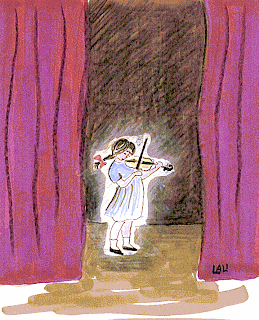
I was eleven years old and about to step on the stage to play a solo violin arrangement of Schubert's Overture to Rosamunde in a recital of my father's students.
My father, who was also my teacher, tuned my strings (I was not advanced enough to do it myself). Then he handed me the violin and said, “serenity, intonation, and a beautiful sound.” And with that he sent me on stage, where I acquitted myself honorably.
Now, a lifetime later and my father long dead, I am revisiting those words, and it occurs to me that they apply to a lot more than to the performance of a student recital piece. In fact, they sound like good advice for how to live my life.
First you have to have Serenity, the clean slate without which nothing good is possible. Next comes Intonation, which means, get it right, be accurate. Then, once you've made yourself calm and gotten the basics right, you strive for A Beautiful Sound. That is the thing that cannot be taught, the mysterious gift of the Muse, made of feeling and talent and luck .
I find that I can apply my father's three precepts to everything from writing to dog training. If I intend to write something, first I have to get calm and clear my mind. (Often, attaining serenity before a writing session means taking a short nap.) As I write, I try to make sure that I get the “intonation” right—not just syntax and spelling, but logic and the flow of ideas. A false note here can cost me a reader's attention. And then comes the Beautiful Sound part--what the cellist Pau Casals used to call “putting in the rainbow”--the part that you never know about in advance, but that you hope with all your heart will somehow happen.
If I am about to train Wolfie, the first part, serenity, is really important. If I am not serene, he won't be either, and the session will be a disaster. I have trouble with serenity when I work Wolfie, because I want too much to succeed, and quickly. I have less difficulty with intonation—stuff like giving clear commands and instant praise. If I get all this right, then on a good day Wolfie and I get to the Beautiful Sound part, where he watches and attends to me and enjoys the challenges I set for him, and I watch and attend to him and manage, for a little while, to speak fluent Dog.
In retrospect, I can empathize with my father at that long-ago recital. He must have felt a measure of anxiety if not compassion on my behalf. And in that last moment before I went in front of the audience he managed to distill into those simple words all his wisdom as an artist, which was also his wisdom as a man.

I wish I had known your father. One of the things I love about this blog is that through it I am getting to hear the voice of such a wonderful man and artist.
ReplyDeleteWhen your father said those words to you, he was certainly serene, he undoubtedly said it with good intonation (since you remember it so well), and the beautiful sound that ensued
ReplyDeletewas ultimately of his making.
oh my such different fathers we had.
ReplyDeleteserenity intonation and a beautiful sound. i'll remember that when i'm commanding riley to "watch me" on the walk this morning.
Elizabeth, I wish that I, as an adult, had gotten to know my father too. As it is, my memories of him are those of a very young person.
ReplyDeleteAnonymous, Yes! And I think that what made those words come out the way they did was the strength of his desire to help his kid at a critical moment.
Laurie, Once you've got them watching you, the rest is easy. Can't say I've gotten there myself yet.
What a beautiful reflection.
ReplyDelete